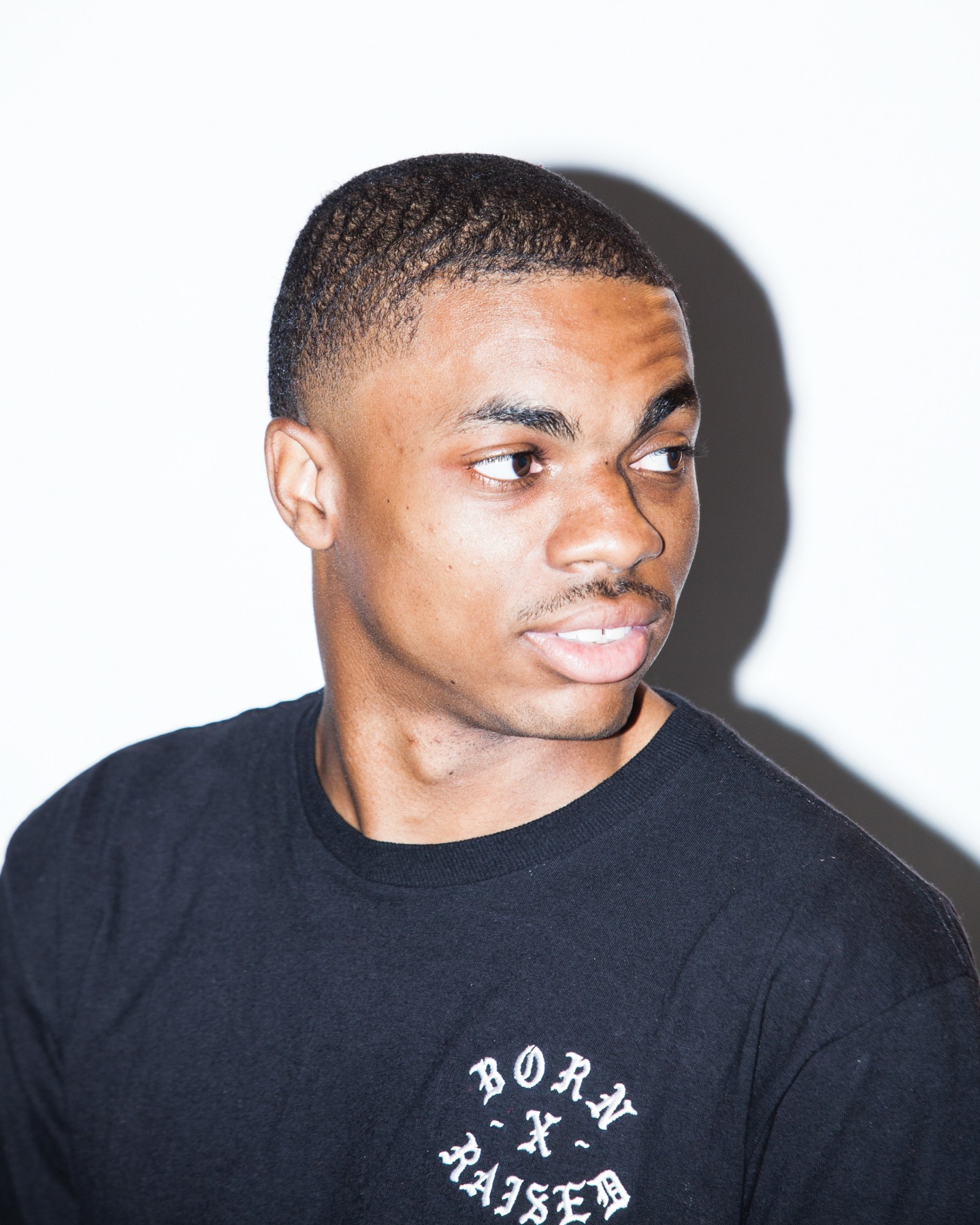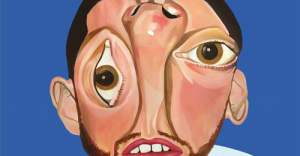What Is The Place For White Rappers Today?
Vince Staples and Mac Miller talk about rap and race.


There are more white rappers today than ever, but there still aren’t very many—you can rattle off a dozen if you really try. Yet somehow, white rappers have attracted a disproportionate amount of attention and accolades: from Eminem’s commercial dominance in the early ’00s, to frat rap exploding out of college campuses in the 2010s, to the surreal scene of the 2014 Grammys, where Macklemore won Best New Artist then apologized to Kendrick Lamar for “robbing” him. Today, the white rapper’s position in hip-hop is a bit like the black citizen’s position in America: both at the center and on the fringe, a group with a complicated history that keeps throwing wrenches into the status quo.
Mac Miller is a white rapper: a Pittsburgh teen turned adult icon who earned indie cred well after he gained fame. Vince Staples is not: he’s a Long Beach smartmouth with a politically militant streak and a Sprite deal. We asked the two longtime rap fans and friends how and why white rappers got popular, what it’s like to be one (and not be one), and whether race in rap matters in the first place.
MAC MILLER: There’s always been a bunch of white rappers in the super-underground scene—cult shit, like Atmosphere. I never listened to any of it, but there was a lot of white people like, “I love white rappers because I can identify with them.” The reason white rappers can do what they do is because white people be hoorah-ing the shit. It’s like when there are white people on an NBA team.
VINCE STAPLES: White people definitely root for white people.
MILLER: That’s a huge reason why it’s become so big right now. People are like, “Yeah! A white guy rapping! I wanna support that because not a lot of white guys rap!” I remember hearing Eminem for the first time in my kitchen: I had a really little TV that was as big as my head, and “The Real Slim Shady” was on MTV. I definitely had a moment of being a young white kid rapping every lyric in the mirror.
STAPLES: I ain’t really fuck with Eminem at first. I saw “Purple Pills,” and I was like, “What the fuck is these niggas doin’?” But I didn’t really care about rapping. I was trying to hear some Ja Rule, like, “Nigga, where Ashanti at? Don’t nobody wanna hear you rappin’ about your momma.” That’s how I was feeling in my younger days. Eminem was too aggressive for me.
MILLER: Now it’s evolved to where you have different types of white rappers. You have a RiFF RAFF, and an Action Bronson, and me, who are all completely different. Earlier, white rappers were just on the super storytelling, very poetic.
STAPLES: "Lyrical miracle spiritual spherical…"
MILLER: They felt like, “I can be a rapper because I can rhyme hella words and be super complex with it.” The crazy thing is, to other rappers, you’re not nice just because you can say “Abomination connotation alteration.”
STAPLES: When you’re white and you rap, you’ve gotta have bars. It’s all about the bars. Mac Miller said, If you don’t love me then just lie to me. That’s a fuckin’ bar.
MILLER: Paul Wall, to the culture, is so important and crazy because he was a white dude that was just like, “I’m just a cool ass white dude, so I’mma rap.” It wasn’t, “I know I’m not supposed to be here, so let me get really next-level.”
“Are we talking about white people that rap, or white rappers? Cause it’s a fuckin difference. White rappers are corny. White people that rap, it’s like, ‘Oh, that’s wassup. You white, you rap.’”—Vince Staples
STAPLES: I thought Paul Wall was Puerto Rican. Are we talking about white people that rap, or white rappers? Cause it’s a fuckin difference. White rappers are corny. White people that rap, it’s like, “Oh, that’s wassup. You white, you rap.”
MILLER: Definitely. The genre of white rapper is not tight.
STAPLES: Yeah, that shit is a genre, bro.
MILLER: And it’s funny because, when [my 2011 album] Blue Slide Park happened, there was a surge of all these kids, and we were able to sell 10,000 units on iTunes just out of nowhere. I remember touring and doing shows, and I was the first rap show ever in all these colleges. Six thousand kids, and I’m the first hip-hop show because I’m white-college-friendly. That was always a demon for me. It was hard to sit here and know that, because I was a white dude, I was able to sell easier and be more marketable. That wasn’t tight to me. I wanted to go through the same shit that everyone else did. But I did that shit, and that shit was huge for me. Recently, I’ve grown up. This is my job, and I’m going to do it. It used to be so difficult for me being a white rapper, but now, it doesn’t eat at me as much.
STAPLES: Maybe you’re not the problem. Maybe the problem is that black people don’t support each other and don’t fuck with each other as much as they should. Maybe Hispanic people don’t fuck with each other and support each other as much as they should. You’re not the problem. White people got the right idea: the first thought, the first action, is to be a supporter.
MILLER: I grew up around people of all different races that were all different types of people. I know white motherfuckers that are wilder than black dudes I know, as far as some thugging shit. That’s a conversation that needs to be put to bed the quickest. Regardless what the percentages and statistics are, the reality is—or, at least mine was—there was motherfuckers that were on some hood shit that were white and black. Race didn’t categorize that exactly.
STAPLES: When it comes to giving credit and showing appreciation, that’s a different conversation. If we’re talking about origins of music, if you’re talking about rock & roll, you have to give credit to Chuck Berry. He invented it; Elvis stole some shit; it’s fine. When you talk about rap, you have to give credit to the South Bronx and that whole community and Afrika Bambaataa. You have to give credit to where it’s due. If we talking about basketball, you gotta give credit to Dr. Naismith. There are people that created things, and who made things, but if we’re talking about someone’s ability to participate in something, then the color of a person should not be in the conversation, period.
MILLER: Good and bad music, it has so much less to do with what race people are. Maybe because dude’s white, the experiences life have given him, that’s why his music is that bad.
“Good and bad music, it has so much less to do with what race people are. Maybe because dude’s white, the experiences life have given him, that’s why his music is that bad.”—Mac Miller
STAPLES: Without the Beastie Boys, there’s no Vince Staples music. So I don’t care about some white rapper shit. My music don’t sound like traditional rap music in that sense. It’s not all black people where I live at; it’s not all white people where I live at. Color has nothing to do with the socio-economic background. That’s a different conversation. Being in a certain social situation and being of a certain kind of class has nothing to do with what color you are. They couldn’t understand Kreayshawn because they never been to Oakland. Anybody that got something to say about the Kreayshawn shit, I suggest you run up on V-Nasty.
MILLER: Hell no. V-Nasty is with the shits.
STAPLES: I want them to try Vanessa. I really do.
MILLER: Vanessa: great human being, kind person, with the shits. 100 percent.
STAPLES: But in general, more people can connect to things in music that are said by white people because white people aren’t as harsh. Not everybody can relate to being in the fucking ghetto and living on welfare and having to kill somebody and having to sell drugs. But they listen to, I want to shop right now, I only got 30 dollars in my pocket. It’s like, you know what, I’ve had 30 dollars in my pocket before. “Same Love,” you know what, I want people to love each other too. Rather than Hannah Montana, Hannah Montana/ I got molly, I got white. I know I don’t have that.
MILLER: Macklemore made songs about things. “Thrift Shop” is about going thrifting. “Same Love” is about sexuality or whatever. But Iggy Azalea, she’s not saying anything. She’s just rapping. That’s not negative, she’s just—it’s different.
STAPLES: These little third grade hoes feel fancy, man. Nobody’s mom in Mayberry is about to let them go to a fuckin’ Migos concert. Are you serious? No. It’s not going to happen. “Oh, the ‘Fancy’ song I like? The video’s cute, go buy the shit.” It’s that fuckin’ simple. If I made Iggy-style music—if I made polite, more easily approachable music—I would understand why kids would be there.
MILLER: Name a black rapper whose subject content isn’t provocative.
STAPLES: Will Smith. And Will Smith was hot. Lil Bow Wow. When these people were little kids? Come on bro.
MILLER: Chamillionaire has never cursed.
STAPLES: White people loved MC Hammer, though. “Can’t Touch This.” Let’s dance, we’re not killing nobody. White people love Michael Jackson. And they love him to this day.
MILLER: I might make a song like “Thrift Shop.” This is a thing that me and Vince agree on, that none of our other friends do. Me and Vince and [Schoolboy] Q.
STAPLES: Q, yeah. I was about to say: Q ready to get that check. I make music at the end of the day. I ain’t worried about sticking to hip-hop. Y’all gotta stop worrying about the race shit. It’s more important shit out there. Ja Rule got a show on MTV, let’s talk about that.
MILLER: I’m on it! I got a cameo.
